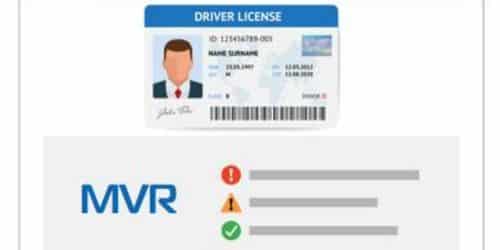When switching auto insurance companies, you may need a Motor Vehicle Report (MVR). You should still look it over before going shopping for new insurance, even if your prospective insurer doesn’t specifically request it. Here’s all the information you might want to know about how to get an instant DMV MVR report and how long it takes. Keep reading!
Read Also: MVR: What Is It, Check & Report
What Is a Motor Vehicle Report?
Your driving record is sometimes referred to as your motor vehicle report (MVR). Think of your driving record as your report card; it contains information about every aspect of your driving history, including accidents, tickets, DUIs, license scores, and even crimes committed while operating a motor vehicle. Your MVR report also contains information about your ticket, such as your gender, weight, and height, as well as facts about the category of license you hold, any limitations placed upon it, any certifications you may have, and any points assessed against it.
Information That Are on an MVR Report
Your motor vehicle report contains your name, birth date, and driver’s license number. Driving under the influence (DUI) charges, license prohibitions, and accident reports are also on your MVR. A lot of states use a ticket system to keep tabs on drivers who have committed moving offenses, but the specific infractions that result in the accumulation of points vary from state to state. Many drivers are familiar with the “points on your license” system because of the phrase that is often used to describe it.
In addition, remember that these points are going toward your MVR score, not your license, so keep that in mind. If you get too many points, you run the risk of having your driver’s license suspended or facing other sanctions, such as being required to take driving classes. The total number of points that you have accumulated on your driving record becomes your MVR score. Not every state has a point-based system or a motor vehicle record score. Those that do use different ways to figure out how many points should be taken off for different traffic violations.
Things to Know About Getting an MVR Report
They include:
- The MVR, which is an official copy of your record, contains your driving record.
- The MVR will show your driving record for the last three or ten years.
- In order to respect your right to privacy, your home address will not be visible on the MVR.
The federal Driver Privacy Protection Act (DPPA) restricts the publication of personally identifying information included in driver license and vehicle registration records. So, unless a user uploads a petition asking for their data to be made public, their data won’t be accessible to everyone.
How to Get a MVR Report
Below are ways on how to get a MVR report:
#1. DMV( Department of Motor Vehicles)
You can get a copy of your driving record from the DMV by sending an email or visiting them. So, if you need your driving record quickly, you’ll have to order it ahead of time because the DMV does not offer rush service.
- Your driving record is immediately available online as a preliminary copy.
- A request for your official driving record will cost you about $10, but this varies by state.
- Less money is spent on copies that aren’t legal.
- When you visit a DMV office in person, you can only pay with cash, check, money order, or ATM/debit card. Unfortunately, they do not take credit cards.
#2. Car Insurance Brokers
- In addition to the public, auto insurance agents can view your driving record.
- Agencies can look at your records and give you a rough draft of your driving record.
- You can get a free copy of your driving record by contacting your insurance provider. (Not everyone can, but you should ask anyway.)
#3. Online Third Party Vendors
- This method is the quickest, but it is also the most expensive and the least trustworthy.
- It’s probable that the reports aren’t as trustworthy as driver’s license or insurance company information.
- Ensure you know if the dealer can get you an official report.
Benefits of Clean Motor Vehicle Report
- Even though insurance companies look at driving records when setting rates, taking a defensive driving course can lower your rates.
- As part of the application process, some companies request access to applicants’ driving histories. There may be federal or state laws that protect your right to privacy at work. Just look into your options.
- Jobs that require driver’s license information will have a legal right to access those documents.
- Driving records can be used as proof in municipal court or other courts.
- Bad driving habits can result in license restrictions, suspensions, or even revocations
What Is Instant MVR Report?
Instant MVR reports give businesses and insurance providers instant access to driving records across the country. It is simple to request their DOT-compliant driving records online through their private account and receive them in real-time directly from the state DMV. You can also place orders for MVRs either singly or in bulk. Along with the driver’s driving record, there is also information about the driver’s background. This information can be used to determine whether the motorist is who he or she claims to be. Also, if you use instant MVR report alerts, any changes to your driving record will show up right away. There are no long-term commitments or recurring costs; instead, simply pay as you go.
DMV MVR Report
Ordering your driving record over the internet, in person, or through the mail will yield the same results. All of these documents are official DMV MVR (Department of Motor Vehicles Report) records. Each one has the identical encryption imprint and includes a credential declaration as well as the Motor Vehicles Commissioner’s initials. There are three types of DMV MVR reports. They are:
#1. Regular Driving Records
The “basic” driver’s license abstract only has information that is required to be kept by the DMV MVR report. Information about what you’ve done over the past few years is likely to be here. Some offenses will be called out for longer periods of time or forever.
#2. Lifetime Driving Records
Ignoring the backup and recovery limitations specified in Motor and Traffic Law. The DMV’s “Career” driving database contains all the licensing information the DMV MVR report presently has about a driver. Data from before a person was given permission to drive legally may not be included.
#3. Lifetime Driving Records
Despite the backup and recovery rules specified in Motor and Traffic Law, DMV MV report “lifetime” records include every piece of data the DMV MVR report currently owns regarding a driver’s license. Information from before the driver was allowed to drive a car may not be included.
What Do Motor Vehicle Report (MVR) and Driving Records Checks Reveal?
An MVR report conducts a search via the database of a state’s department of motor vehicles or another organization of a comparable nature. The MVR report will reveal if a candidate’s driver’s license is active or revoked, as well as any driving-related violations. The majority of states only send records for the most recent three years, while other states go back as far as five, seven, or even ten years. The state of license distribution (where your application has a license) reviews a motor vehicle record. However, this does not include traffic infraction data from other states. The following information is necessary to perform a check on your driving record:
- The candidate’s full name, as it appears on the license.
- The state in which the license is currently held.
- Identification number from the driver’s license
When you do a driving record check, you get a report with the following types of information:
- Status of the driver’s license (valid, suspended, expired, etc.)
- Classification (such as driver’s license, professional driver’s license, etc.)
- Convictions for both felonies and misdemeanors (DUI, DWI)
- Infractions of the moving vehicle traffic law, suspensions, and limitations
How Long Does Mvr Report Take?
Most of the time, a search of a Motor Vehicle Report (MVR) can be done in one to three days during normal business hours.
If you have lived in different states and have different driving records from each one, the process may take longer for you. However, as long as your record is relatively clean, you should be able to start generating income from driving within a short period of time. Before you start, make sure you have an insurance policy that covers you to drive for a ridesharing service. Install the Jerry app, and in barely one minute, you’ll be able to browse through multiple competitive estimates for the auto insurance policy that meets your requirements.
How Does an MVR Impact Car Insurance?
Your motor vehicle record (MVR) is one of the many things that auto insurance companies look at when deciding how much to charge you and whether or not to cover you. Your record as a driver will play a key role in deciding the cost of your auto insurance policy. Because you are more likely to submit an auto insurance claim if you have a history of obtaining speeding citations or driving dangerously. Insurance carriers will normally charge you extra for insurance if you have a history of either of these behaviors. In contrast, more significant incidents, such as being at fault in an accident, will almost always have a greater influence on the cost of your auto insurance policy than lesser infractions.
How Far Back Does an MVR Report Go?
This differs depending on the state. The majority of states have lookback periods ranging from three to seven years. You can obtain MVR reports from a country’s Department of Motor Vehicles (DMV) or a similar institution (for example, the Registry of Motor Vehicles, or RMV in Boston). However, there is no database administrator at the national level that allows for the querying of driver records.
Is MVR Report Free?
Yes, the mobile app provides free access to two years of driving records. Via the app, you can also ask for an MVR report that covers the past three or seven years, with or without certification.
How Do I Get a PA MVR?
You can get a copy of your driving record by accessing it on the internet. You will need to have your birth date, the last four numbers of your Social Security number, your vehicle’s license plate number, and the data on your credit card.
How Do I Get a Texas MVR?
You can ask for your driving history online or through the mail if you have a Texas driver’s license, CDL license, or identification card. Currently, there is no site for the Department that can allow access to drivers’ information in person.
What’s a Lifetime vs Standard Driving Record?
In some states, your motor vehicle record, or MVR, can be broken into two parts: your normal driving record and your lifetime driving record. Your normal driving record reveals that you’ve committed offenses in recent times. The range of time that is considered “recent” depends on the laws of the state where you live, but it is usually only the last five to ten years. Some states do not keep lifetime driving records, but others do. Every moving violation that has ever been filed against you is on your driving record.
How Long Do Violations Remain on Your Driving Record?
Tickets for more common infractions, such as speeding, have a greater likelihood of “falling off” your record quickly, typically within three to five years. Convictions for more serious offenses, such as driving under the influence of alcohol or driving while intoxicated, can stay on your record for a very long time. In the end, it will come down to how long your state maintains certain offenses on its driver’s license and vehicle registration records.
References
- metromile.com
- idrivesafely.com
- mvrcheck.com
- dmv.ny.gov






